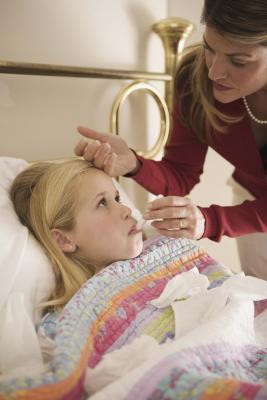A fever itself is not harmful, unless the fever determined orally is above 106 degrees F. In fact, a fever is not a disease. A fever is merely a symptom of something else going on with your child, such as an illness or an infection. However, if your child is younger than 3 months old and has a rectal temperature above 100.4 degrees F, you need to call your doctor. The same goes for a baby aged 3 to 6 months with a rectal temperature above 101 degrees F or a 6-month-old with a rectal temperature above 103 degrees F. In those cases, call your doctor.
Home Treatment or Doctor
You can try home remedies for older children who have a fever. According to KeepKidsHealthy.com, the temperature is not the main concern; how your child acts is. If your child is active, alert, breathing normally, eating and sleeping, you can treat the fever at home. On the other hand, if your child is lethargic, confused, has trouble breathing, won’t eat or drink and has specific symptoms, such as a severe headache or a burning feeling when he urinates, you need to call your doctor. If you are not sure what to do, call your doctor.
Medicine and Fluids
You can treat your child’s fever with over-the-counter fever-reducing medication. Choose products that contain acetaminophen or ibuprofen. These products should make your child more comfortable. Never use aspirin because it can cause Reye’s syndrome, a serious brain and liver disease. If your child has a mild fever and does not feel bad, you should not give medicine at all. People overuse fever medicines, according to the Pediatric Health Care website. You should also make sure your child drinks plenty of fluids. Fevers can make people dehydrated.
Starve a Fever
You may have heard the expression, “Feed a cold, starve a fever.” If you wonder if that saying has any validity, that’s because it does and it doesn’t. Dr. Scott Joy of Duke Medicine told DukeHealth.org that you could probably find that advice in old medical books, right along with blood letting. The point being that while you should not take that advice at face value by starving your child when she has a fever, recognize that she probably won’t feel much like eating. The body naturally loses its appetite to focus the immune system on fighting pathogens. Don’t force your child to eat, but don’t starve her either.
Bathing
You can bathe or sponge your child, but make sure the water is not too hot or too cold. Hot water can raise the body temperature. Cold water may make your child shiver, which can raise your child’s temperature even more. Never use alcohol in the bathtub because it can cause a coma. Also, never leave your child alone in the tub.
Dressing
Dress your child in one layer of lightweight clothing. Never bundle him. Bundling can cause the fever to go up. If your child feels cold, you can give him a blanket or a warm drink.





